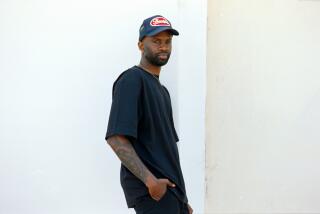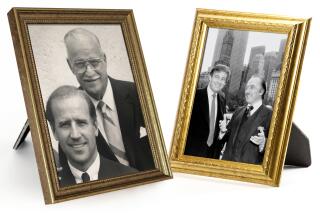Book Review : Harking Back to History of Special Kind
- Share via
Fathers and Children by C. L. Sulzberger (Arbor House: $19.95: 261 pages)
Let us now praise famous men, and our fathers that begat us. C. L. Sulzberger, the venerable journalist and historian, honors the biblical injunction of Ecclesiasticus in “Fathers and Children,” an endearingly old-fashioned collection of essays on famous fathers, sons and daughters throughout history: Philip of Macedon and Alexander the Great, Henry VIII and Elizabeth I, Frederick William and Frederick the Great, John Adams and John Quincy Adams, Dumas Pere et Fils (and Thomas-Alexandre, the black general of Napoleon’s army, who was the family patriarch), Arthur and Douglas MacArthur, Joe and Jack Kennedy, and a half-dozen other pairs of fathers and children.
Sulzberger’s 14 essays are a poignant reminder of a certain style of history and journalism that now strikes us as antique. Indeed, Sulzberger himself is something of an antique--he harks back to an era when a journalist who possessed a famous byline in a well-read newspaper was not merely a reporter of events, but also a confidant of the men who make history. Thus, for instance, Sulzberger’s account of Douglas MacArthur is informed by his own chats with “America’s only field marshal” (“The Soviet . . . is white,” MacArthur told him, “but at heart he is a Tartar. He thinks in terms of decades or centuries.”), and those who fought with and against him (“In March, 1955, I spent an evening in a large circular wooden bathtub in the southern port of Pusan with South Korea’s defense minister. . . .”)
A Proud Insider
Sulzberger proudly portrays himself as an insider. He boasts, for instance, of secretly briefing John F. Kennedy before his talks with Charles de Gaulle (another of Sulzberger’s acquaintances) and confides that Khrushchev used him as a private emissary to Kennedy. And he allows that “the steadiest flow of ladies since Warren G. Harding’s day passed through the White House” during the Kennedy presidency (“Jack’s, however, were more attractive,” he confides). But Sulzberger is honest enough to reveal his own bias: “I heartily disliked Joe Kennedy Sr.,” he writes. “The better I knew Kennedy, the more I disliked him, despite the fact that he initially treated me with the amiable jollity he reserved for newspapermen expected to do his bidding.”
Sulzberger’s essays tend to ramble, but it is the rambling of a richly experienced raconteur, an old soldier of journalism whose memory is itself a primary source of history. At first, I was convinced that the master’s prose should have been subjected to an editor’s blue pencil--Sulzberger uses the word brutal and its variants at least a half-dozen times to describe Henry VIII, for example, and he characterizes Churchill first as “the most magnificent Briton since . . . Alfred the Great” and, a few pages later, as “the greatest Briton since Elizabeth I.” But I was eventually won over by the sheer charm of Sulzberger’s rocking-chair recollections.
And I welcomed “Fathers and Children” as a kind of refresher course in Western civilization--Sulzberger takes it for granted that an educated person will recognize his allusions to classical literature and world history (“Every literate person knows . . . “ he is given to say), but he is generous enough to explain them anyway.
A Happy Device
I hasten to point out that the pairings of famous fathers and their offspring is mostly a rhetorical device, and happily so. Sulzberger does not indulge in amateur psychohistory, or at least not much of it, and he is clearly more interested in the sweep and grandeur of history than in the dirty little secrets of monarchs and generals. He favors predictable irony and historical curiosity: For example, he points out that Frederick William, who detested the French, sent condemned prisoners to the gallows dressed up in French garb; his son, Frederick the Great, who insisted on speaking French and imported Voltaire to decorate his court, remarked that “if God made the world for me, he put France there for my entertainment.”
In fact, “Fathers and Children” is mostly an excuse--as if an excuse were needed--for another book of historical memories by Sulzberger, an accomplished memoirist. When Sulzberger conjures up Churchill and De Gaulle, Kennedy and Nehru, he writes almost as a crony. And it’s both beguiling and slightly comic that Sulzberger adopts the same chatty tone in writing about the Bellinis and the Borgias. Indeed, Sulzberger quotes Alexander the Great in an easy and off-handed manner that suggests he, too, spent some time in a hot tub with the famous scrivener.
More to Read
Sign up for our Book Club newsletter
Get the latest news, events and more from the Los Angeles Times Book Club, and help us get L.A. reading and talking.
You may occasionally receive promotional content from the Los Angeles Times.









